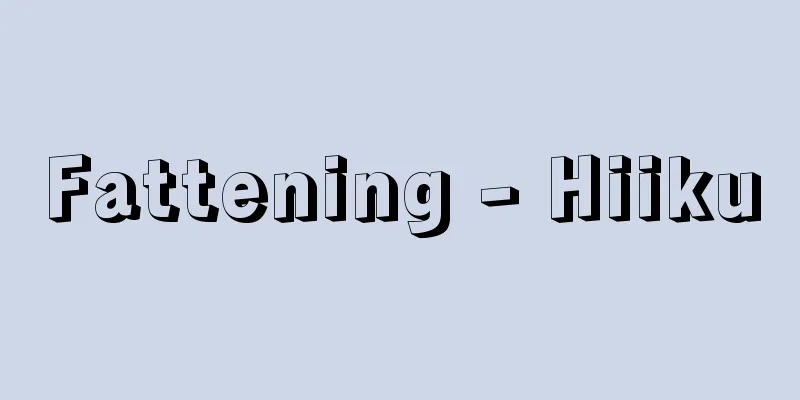Cetane number - Setanka (English spelling)

|
It is an index showing the ignition quality of diesel fuel, and the higher the cetane number, the better the ignition quality of the fuel. In diesel engines, after fuel is injected into the compressed heated air in the cylinder, it spontaneously ignites and burns. If the fuel has poor ignition quality, the time it takes for it to ignite (called ignition delay) is long, and during this time the fuel accumulated in the cylinder burns all at once, causing the cylinder pressure to rise too rapidly, resulting in a diesel knock phenomenon similar to the knocking in gasoline engines, and reducing thermal efficiency and output. Small high-speed diesel engines in particular have a short stroke time, so they are prone to diesel knock, and it is necessary to use fuel with good ignition quality and short ignition delay. The ignition quality of diesel fuel varies greatly depending on its chemical structure, with normal (straight-chain) paraffin being the best, while isoparaffin with many branched chains and especially aromatic hydrocarbons being the worst. In this respect, it has a completely opposite relationship to the anti-knock quality (octane number) of gasoline. The cetane number of diesel fuel is determined by using two types of hydrocarbons as standard fuels: cetane (n-hexadecane), a typical component with good ignition properties, and α-methylnaphthalene, a typical component with poor ignition properties, with their respective cetane numbers set at 100 and 0, and expressing the ignition properties of a standard fuel made by mixing these two components in any ratio as the volume percentage of cetane in the fuel. However, since α-methylnaphthalene is prone to deterioration during storage, heptamethylnonane, with a cetane number of 15, has been used since 1962 as a low cetane number standard fuel, and the cetane number is: [Hara Nobuyoshi] [Reference] | |Source: Shogakukan Encyclopedia Nipponica About Encyclopedia Nipponica Information | Legend |
|
ディーゼル燃料の発火性の良否を示す指数で、セタン価が高い燃料ほど発火性が良好なことを示す。ディーゼルエンジンでは、燃料が気筒内の圧縮加熱空気中に噴射されたのち、その自然発火により燃焼をおこす。この際、燃料の発火性が不良な場合は、着火するまでの時間(着火遅れという)が長く、この間に気筒内に蓄積された燃料が一時に燃焼をおこすため、気筒内圧力の上昇が急激にすぎ、ガソリンエンジンにおけるノッキングに類似したディーゼルノック現象をおこし、熱効率・出力が低下する。とくに小型高速ディーゼルエンジンでは、一行程の時間が短いため、ディーゼルノックをおこしやすく、発火性が良好で着火遅れの短い燃料を使用することが必要である。ディーゼル燃料の発火性はその化学構造により大きい差があり、ノルマル(直鎖状)パラフィンはもっともよいが、枝鎖の多いイソパラフィンや、とくに芳香族炭化水素はもっとも不良である。この点ガソリンのアンチノック性(オクタン価)とはまったく逆の関係にある。 ディーゼル燃料のセタン価は、発火性が良好な代表的成分のセタン(n‐ヘキサデカン)、および発火性が不良な代表的成分のα‐メチルナフタレンの2種の炭化水素を標準燃料とし、それぞれのセタン価を100および0と定め、これら両成分を任意の割合に混合した標準燃料の示す発火性を、この燃料中のセタンの容量%の数値によって表す。しかしα‐メチルナフタレンは貯蔵中に変質しやすいため、1962年以降、低セタン価標準燃料としてセタン価15のヘプタメチルノナンを用い、セタン価は、 [原 伸宜] [参照項目] | |出典 小学館 日本大百科全書(ニッポニカ)日本大百科全書(ニッポニカ)について 情報 | 凡例 |
Recommend
Eliade, Mircea
Born: March 9, 1907, Bucharest [Died] April 22, 19...
Kisochidori - Kisochidori
A perennial plant of the orchid family (APG class...
JOIDES
…As part of the International Earth's Interio...
Brehon Laws
A general term for the laws that summarized the ri...
Shoufukutei Fukumatsu
Year of death: October 14, 1904 (Meiji 37) Year of...
Common emerald dove (Chalcophaps indica)
Columbiformes, family Pigeonidae. Total length 23-...
SRC Construction - SRC Construction
…A structure in which a steel frame is encased in...
Coastal sand dunes
These are masses of sand distributed along the co...
Uchikake - Uchikake
It is also read as ryōtō and written as uchikake. ...
Asmodee (English spelling) [France]
A demon that appears in the Old Testament apocryph...
Okazaki Kengyo
...Folk songs about Gengobei and Oman, a man and ...
One-eyed
1. The number of eyes is one. First "The mons...
Oyamafugu - Oyamafugu
...A marine fish of the Tetraodontiformes order, ...
Lending market - lending market
...It is composed of various individual markets o...
Historical novels
Historical fiction is a composite concept of &quo...









![Ohata [town] - Ohata](/upload/images/67cb17a047dab.webp)